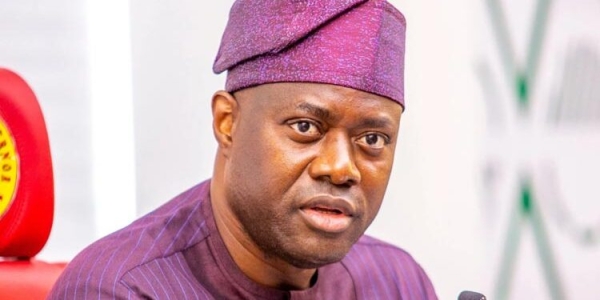The Oyo State Governor, Seyi Makinde, on Wednesday, declined assent to the Presumptive Tax Bill passed by the state House of Assembly, citing the current plight of the people.
Makinde rejected the bill on the grounds that it would impose additional burdens on the poor, stating that the people were already struggling due to the current economic reality in the country.
“Anything that will put money in the pocket of the people is what I am interested in, so they can use it where it is needed most. At this time, I’m not interested in any policy that will empty their pockets. I’ll continue to fight poverty and not fight the poor,” the governor said.
Makinde expressed his position on the bill while recognising the Speaker of the Oyo Assembly, Debo Ogundoyin, during the flag-off of the upgrade of Samuel Akintola Airport to an international standard.
He stated that he would not implement the bill for the moment.
The governor, however, praised the Assembly for the initiative, which he believed was aimed at increasing the state’s Internally Generated Revenue.
Last week Thursday, the Oyo State House of Assembly passed the State Presumptive Tax Bill, 2023, which provides for the imposition, administration, and collection of presumptive tax on individuals and entities whose income cannot be ascertained due to lack of financial records.
The bill outlines various presumptive tax rates for different enterprises, including artists and sign writers, barbers, bricklayers, carpenters, grinding mills, gas refilling depots, hairdressers, horticulturists, photographers, plank sellers, plumbers, welders, mechanics, block makers, saw millers, book stores, and typing studios.
Under the section of the law titled: “Oyo State Negotiated Presumptive Tax Rate,” owners of adult wear boutiques are liable to pay a minimum of N10,000 yearly and maximum of N50,000; barbers to pay from N3,000 to N10,000; artists and sign writers to pay from N5,000 to N50,000; bicycle repairers to pay between N2,000 and N10,000; bookshop/stationary stores to pay a minimum of N10,000 and maximum of N20,000; bricklayers to pay from N10,000 to N30,000; sellers of building materials to pay from N15,000 to N50,000; furniture makers to pay N25,000 to N40,000; carpenters are to pay between N10,000 and N35,000; gas station operators are to pay between N25,000 and N45,000; while photographers to pay between N2,000 and N5,000.
Also, plumbers are to pay between N2,000 and N10,000; welders to pay from N5,000 to N20,000; fruit sellers to pay from N1,000 to N5000; sallers/repairers of handset to pay between N2,500 and N4,000; shoemakers to pay between N500 and N2,000; laundry shop owners to pay from N1,000 to N2,500; blockmakers to pay between N15,000 and N25,000; vulcanisers to pay between N2,500 and N7,500; mechanic/welder/rewire are to pay between N1,500 and N5,000 and plank sellers to pay between N2,500 and N10,000.
The bill stipulates that a taxable person who fails to make the payment of the tax shall be liable to pay the sum and a penalty equal to 10 per cent per annum, while those who maintain up-to-date records and file returns within the stipulated period shall be granted a rebate of two per cent of the tax payable.
The law also specifies that persons subject to presumptive tax must file returns on or before 90 days from the commencement of each year.
Upon payment of all tax assessments, taxable persons will be issued a tax clearance certificate.


